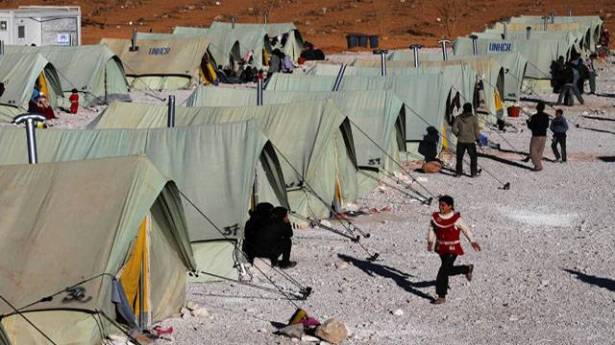Has the world become numb to the utter brutality in Syria?
Brooklyn Middleton/Al Arabiya/February 21/16
At least 50 people were mercilessly killed when Russia and the Assad regime bombarded several hospitals – including a Doctors Without Borders (MSF)-supported facility – in Syria this week. Schools being used as shelters were also targeted. MSF officials indicated the attack on their hospital in Maarat al-Numan, Idlib province, appeared deliberate, with four missiles hitting the site within just minutes of each other. Meanwhile, a women and children’s hospital in Azaz, was targeted in a brutal ballistic missile attack. According to the Human Rights Watch (HRW), a total of seven hospitals and two schools in Syria bore the brunt of the attack on 15 February alone. The Russian military and the Assad regime carried out these criminal attacks only days before a “cessation of hostilities” was slated to take place – a so far meaningless agreement brokered by Washington DC and Moscow officials. Five years since the beginning of the conflict, the horrors inflicted on the Syrian people are now intensifying, with Russia and Bashar al-Assad’s disgraced regime continuing to massacre with impunity. This week underscored Moscow’s latest strategy, which appears to be conning the U.S. and other involved actors into assessing it is interested in halting the bloodshed in Syria while it worsens its attack on Syrian civilians on the ground. The number of attacks that intentionally hit sites providing critical care this week is staggering. Five years on, it seems the world is at serious risk of becoming numb to the utter brutality in Syria.
Attack aftermath
Activists circulated one especially haunting photograph on twitter after an attack in Azaz: A colourful blanket wraps a badly mangled woman and her dead baby, which was still attached by the umbilical cord to her own corpse. Another photo shows two toddlers, one in a red and white striped onesie and another in a green sweater, laying lifeless and covered in dust. “Goodbye cruel world,” wrote @RevolutionSyria. The targeting of hospitals – an Assad regime strategy being upheld by Russia – serves a broader purpose than just obliterating health care temporarily. As attacks continue to target civilians and those attempting to provide life-saving care, it is worth asking how large scale of a massacre would have to be committed to trigger intervention on behalf of Syrian civilians. During an interview with PBS Newshour, New York Times Beirut bureau chief Anne Barnard explained why so many medical facilities and schools are being intentionally targeted. “There may be a strategy of trying to depopulate areas…that are not likely to come back into the government fold,” she noted. Such deliberate planning for the future further highlight Assad’s commitment to maintaining his grip on power. Amid the horrific attacks in recent days, the United Nations was reportedly able to gain access to at least five besieged areas, delivering critical aid to approximately 82,000 people. Meanwhile, U.N. officials have indicated that plans for humanitarian aid drops appear to be progressing toward implementation. Such developments are indeed positive but unless the Assad regime has agreed to stop using siege and starvation as means of warfare – including in Aleppo – the suffering is likely to continue in the long-term. As attacks continue to target civilians and those attempting to provide life-saving care, it is worth asking how large scale of a massacre would have to be committed by the Assad regime, Russia or any other nefarious actor, to trigger intervention on behalf of Syrian civilians. The longer this bloody conflict continues, the more likely we are to have an answer.
Syrians must surrender now to fight another day
Mohamed Chebarro/Al Arabiya/February 21/16
All the indications from Syria are that the war is won by Assad and his allies. This is thanks to Russian fire power, Iranian foreign legion militias, and the regime’s deep state still alive and kicking in many opposition held Syrian towns. Unless a miracle happens – and in the Middle East rarely we see one – the next Geneva conference should be a face saving surrender signing ceremony. The opposition and its allies, Turkey, Saudi Arabia, and Qatar, have no other option but to surrender now and fight another day may be. Assad has won the bet, in five years he managed the crisis according to deja vu rule book of dictators. The Syrian people’s uprising against his rule was a source of hope to 25 million Syrians who wanted to breathe freedom after 40 years of Assad family brutal rule. Quickly Assad infiltrated the peaceful opposition loosely knit groupings. He released violent Islamist militants from prison and handed them weapons.
Then, the revolution metamorphosed into a so-called war on terror by Assad regime and his Iranian, Lebanese and Iraqi allies. However, this war remained a war for self-defense from the opposition point of view. The slaughter gradually began, and in five years 300,000 Syrians were killed, imprisoned and tortured. As many as 12 millions or more are displaced. The Assad regime, and his Iranian and Russian allies, could claim to have won the day. On the international scene, few elements have helped advance Assad’s travail. The Obama administration’s non-leadership and his bid to clear his predecessors’ mess by denying Washington new adventures in the Middle East and beyond, Obama left Iraq to the Iranians, Afghanistan to a resurgent Taliban, and Syria and Ukraine to an emboldened Vladimir Putin.
Obama left Iraq to the Iranians, Afghanistan to a resurgent Taliban, and Syria and Ukraine to an emboldened Vladimir Putin
Apart from France, the Europeans lacked resolve as usual. The EU saw the Syrian crisis only from the prism of refugees arriving in their thousands to their shores. Only France grasped that Assad came good on his promises that either his regime would survive or the region and beyond will inherit ISIS and its sister terror organizations. Oddly enough, France stood firm opposing Assad, until the terror attacks hit satirical magazine Charlie Hebdo in Paris in early 2015, and later the Bataclan theatre. This was clearly a punishment for France who maintained all along that removing ISIS goes through removing Assad.
Israel also played its part lobbying from the onset of the revolution for Russia to block any U.N. resolution to speedily stop the onslaught or remove Assad. The Israeli mindset was not to mind trouble on its border that weaken its enemies and distracts the world’s attention from its continued occupation of Palestinian lives and territories. If the Syrian war results in a carved up Alawite, Kurdish or Islamist state in Syria, then this will definitely serve best the minority mini-religious and ethnic state Israel feels more secure to find as neighbors!
Iran’s league
Iran has been in a league of its own vis-à-vis the conflict in Syria. From the start Iran’s supreme leader Ayatollah Khamenei announced that protecting Damascus is as important as defending Tehran. As the conflict unfolded, Tehran stayed the course sending advisors, arms and underwriting the regime financially to aid Assad’s embattled army. It ordered Lebanese militia Hezbollah forces into Syria and funded and trained Afghani and Iraqi Shiite and deployed them to fend off Syrian regime frontlines. Iran quickly turned the tide and gave Assad regime a lifeline to the point that Iranian leaders boasted that Tehran controls four Arab capitals namely Beirut, Baghdad Damascus and Sanaa. Among the Syrian people free of Assad camp, Turkey, Qatar and Saudi Arabia, their differences worked miracle for keeping Assad in power. The discord between a Saudi Arabia sensitive to see Syria’s fall to the Muslim Brotherhood, and Qatar and Turkey championing the Brotherhood to play a lead role in Syria’s future, further divided an already divisive opposition. The Turks also went along with eyes fixed on removing Assad and any future Syrian Kurdish enclave on its southern border controlled by PKK clients Kurdish forces. All the above conspired against the freedom of the Syrians and today with revived tsarist Russian dreams in the Middle East and beyond, two options remain on the agenda. One is for the Syrian opposition to surrender and apologize to Syria’s president Bashar Al Assad for pushing him to kill 300,000 misled Syrians turned violent terrorists and hope for history to allow them a better opportunity to remove him before his son Hafez is of age to inherit Syria from his embattled father Bashar. The second option would be for allies of the Syrian opposition to dispatch surface-to-air missiles to vetted opposition groups. Checking the Russian air supremacy over Syria, and denying Assad air force access to the skies will reduce the mercenary contingents’ land grab and might therefore push all parties back to Geneva, not to sign a surrender, but to implement U.N. resolution 2254 that could see a sharing of power in Syria hopefully without Assad.
ctor is going to be the real growth in world economy without which the oil market will remain at the risk of high volatility.





















